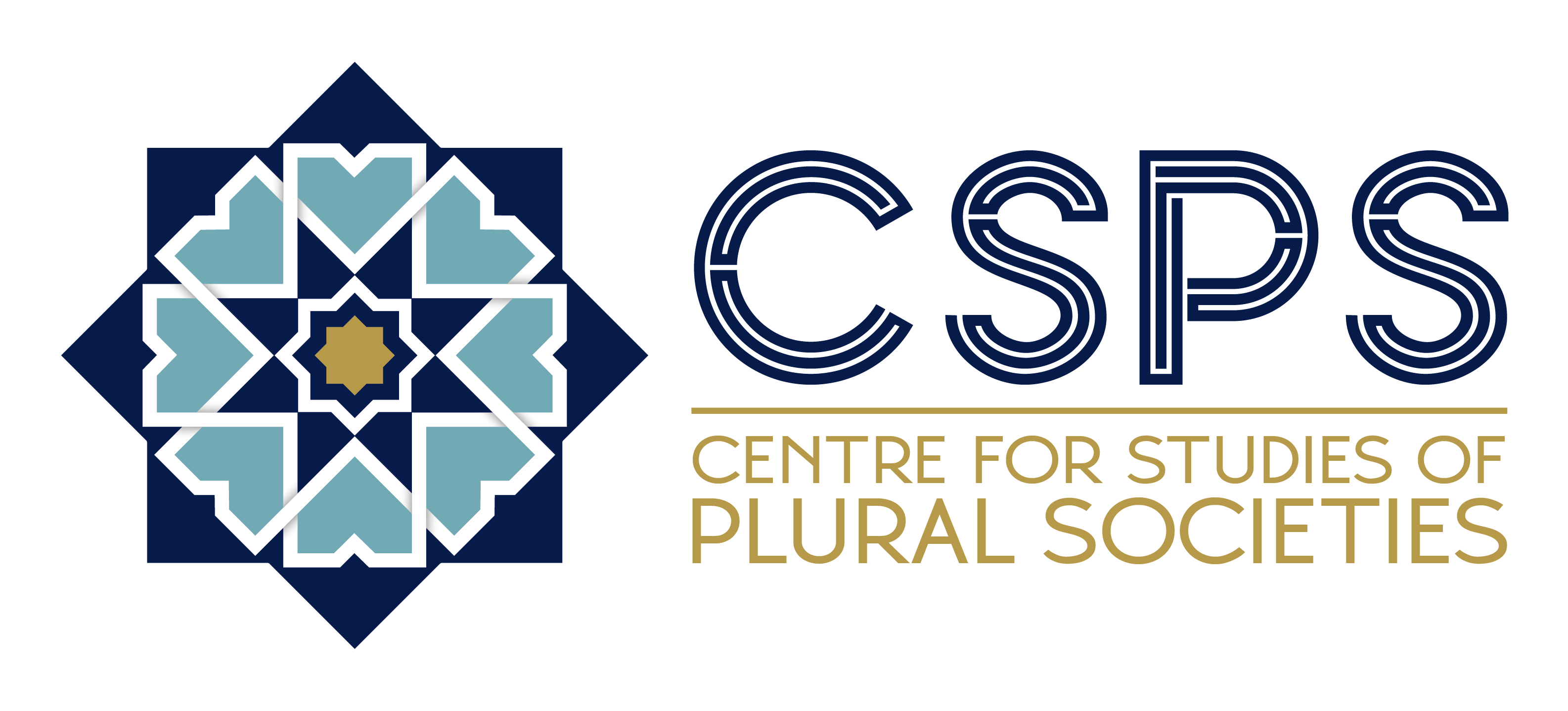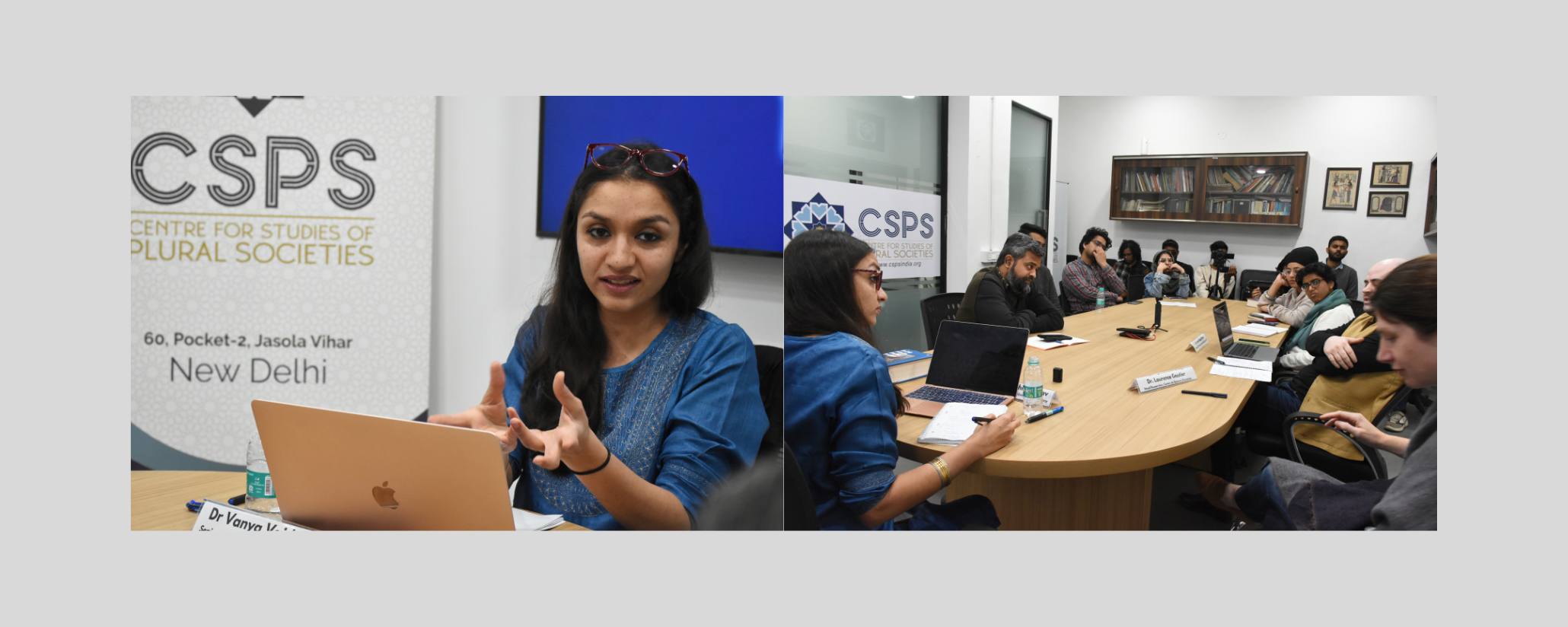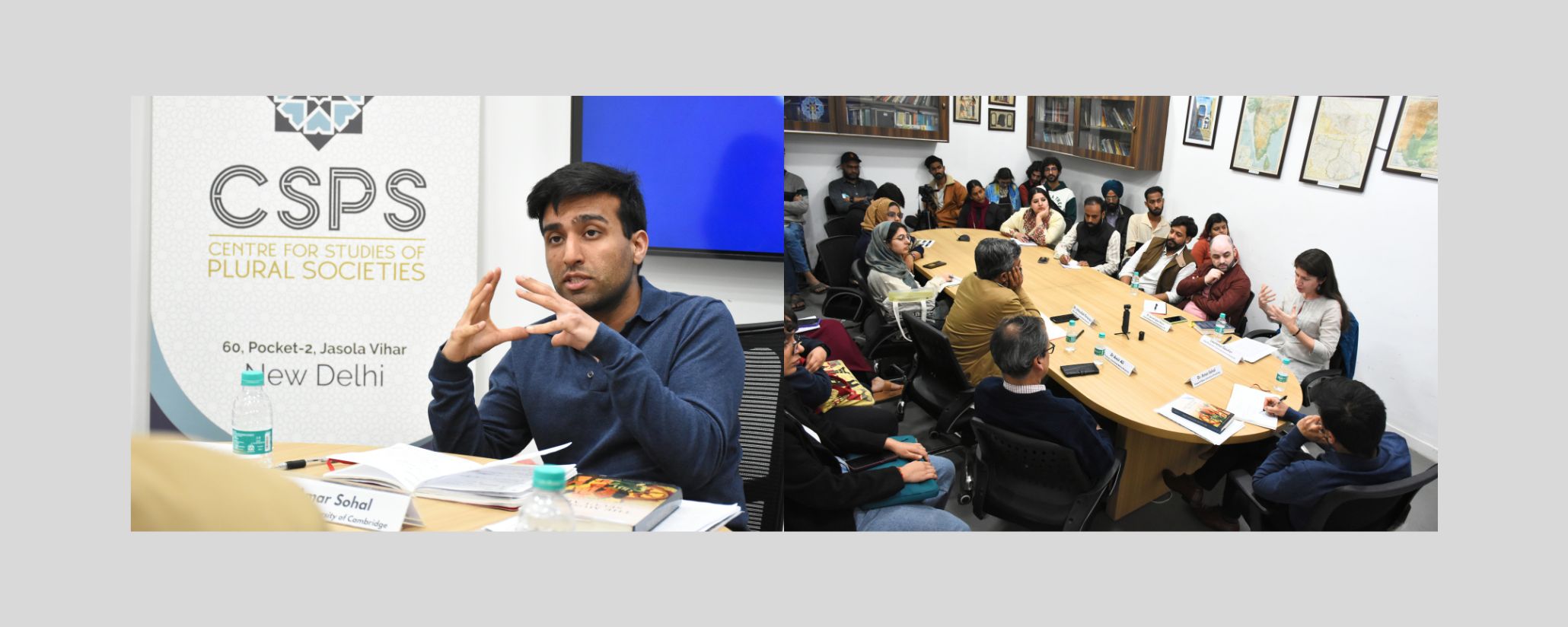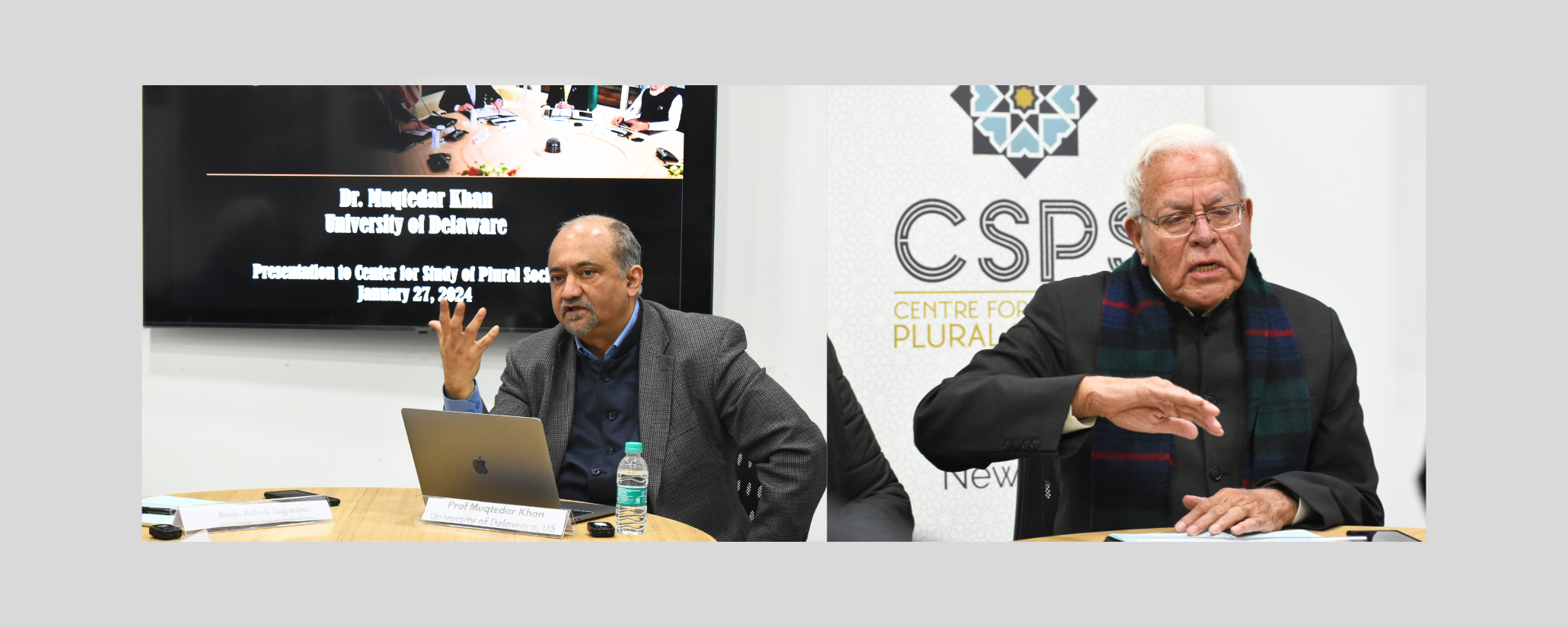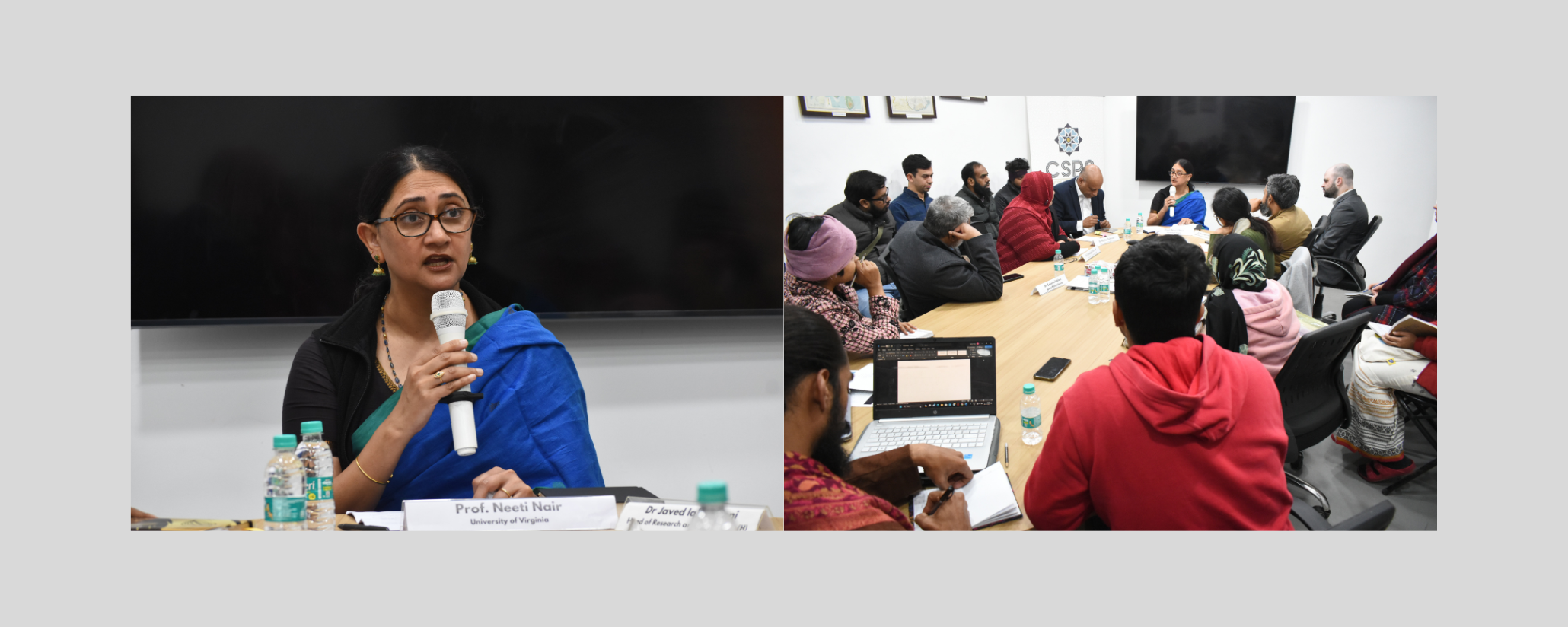Centre for Studies of Plural Societies (CSPS) organised a book discussion on “Being Hindu, Being Indian” authored by Dr Vanya Vaidehi Bhargava. The session was chaired by Dr. Laurence Gautier, Head Researcher at Centre de Sciences Humaines (CSH) and moderated by Dr. Javed Iqbal Wani (Senior Assistant Professor at Ambedkar University Delhi; Head of Research and Publication at CSPS). It was also attended by Dr. Irfanullah Farooqi (Assistant Professor, South Asian University), along with doctoral scholars and students from various universities.
Vanya Vaidehi Bhargav introduced Lala Lajpat Rai as a figure associated with Bhagat Singh in popular culture. His importance is viewed through the image of Bhagat Singh being hanged for killing JP Saunders in revenge for Rai’s murder during a police lathi charge. Moreover, in the contemporary socio-political climate, he is hailed by right-wing extremists as the embodiment of their ideology. This implies that even though Bhagat Singh admired him, he was not necessarily aligned with Rai’s views. It is in this light of prevalent discourse that Bhargav takes up Rai’s figure and pulls down what she sees as the garb which effaces the ideological uniqueness of Rai in face of his and our contemporaries. “According to Bhargava, despite being a Hindutva fundamentalist, Rai differed significantly from the fundamentalism prevalent today. She argues that Rai’s ideology, though extremist, evolved over time and allowed more flexibility and inclusivity than it is typically credited for. Being Hindu, Being Indian invites readers to treat Lajpat Rai’s ideas as a gateway to think more deeply about history, politics, religious identity and nationhood.’
Looking at Lajpat Rai’s works, Bhargava explains how he disagreed with the idea of complete freedom in practicing one’s religion. Despite advocating tolerance for other religious practices and their inclusion in the freedom struggle, he also believed that ultimately, Hinduism would influence all other practices for true Indian unity. It’s important to note here also that his views kept changing throughout his life, and he grew to be more flexible about the inclusion of other identities as time went by. However, his emphasis on the Hindu character of ideal freedom remained biased and strong.
‘By revealing the complexities of Rai’s thinking, the book provokes us to think more deeply about broader questions relevant to present-day politics: Are all expressions of ‘Hindu nationalism’ the same as Hindutva? What are the similarities and differences between ‘Hindu’ and ‘Indian’ nationalism? Can communalism and secularism be expressed together? How should we understand fluidity in politics? Being Hindu, Being Indian invites readers to treat Lajpat Rai’s ideas as a gateway to think more deeply about history, politics, religious identity, and nationhood.’
The event concluded after a lengthy session of questions and answers. Dr. Wani commented on the book’s textual structure, noting how the writing style mirrors Rai’s idiom. Dr. Irfanullah Farooqi questioned about the boundaries of inclusion and exclusion in terms of how they function when dealing with such issues in the contemporary situation. Dr. Laurence Gautier posed further questions about nationality, cultural identity, and politics. The concerns raised by the audience included the lack of local geopolitical context in which Rai was involved, which is crucial for understanding his standpoint. The problem of categorization was also explored, as focusing solely on Hindu-Muslim identity ignores other communities and their engagement with the subject. Dr. Wani gave a vote of thanks and expressed gratitude to the speaker and chair for their participation.
About the seakers:
About the author: Dr Vanya Vaidehi Bhargav is Senior Research Fellow at Humanities Centre for Advanced Studies “Multiple Secularities – Beyond the West, Beyond Modernities”, Leipzig University (GER). She received her Phd from the Faculty of History, University of Oxford. Her research focuses on Modern Indian Political thought, Intellectual History, Religious and Secular Nationalism, Religious and Political thought.
About the chair: Dr Laurence Gautier, Head Researcher in History, Politics, and Society at CSH, holds a PhD in History from the University of Cambridge. Her research focuses on Indian Muslims’ position in the nation post-partition, examining their status as citizens and as a minority group. Particularly interested in their political representation beyond party lines, she explores the role of Muslim universities in debates around national integration, minority rights, and secularism. Laurence is currently preparing a monograph titled “Between Nation and Community: Muslim Universities and Indian Politics after Partition” for Cambridge University Press, building on her thesis. She also co-edited a special issue on historicizing Sayyid-ness in South Asia and is collaborating on a prosopographical study of Muslim leaders post-independence. Additionally, she is starting a new project on Congress’s “Muslim” policy after independence, exploring tensions between secular nationalism and their treatment of Muslim citizens. Her recent publications delve into topics such as the role of Jamia Millia Islamia around partition and the status of Aligarh Muslim University.
The report is prepared by Sehajdeep Kaur and Iffat Khatoon, research interns at CSPS
